Peter MALONE
Saturday, 18 September 2021 19:28
Tintorera
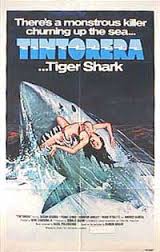
TINTORERA
Mexico, 1977, 126 minutes (original running time; UK & US running time 89 minutes), colour.
Susan George, Hugo Stiglitz, Andres Garcia, Fiona Lewis.
Directed by Rene Cardona Jr.
Tintorera is an attempt to cash in on the popularity of the 1975 Jaws. This time a tiger shark is menacing the east coast of Mexico. Two hunters are in pursuit accompanied by a British woman (Susan George).
There is some action, some beautiful colour photography, underwater photography – and more than a dollop of sexual activity.
The film is conventional, rather exploitative and a reminder of how popular these themes were in the mid-1970s.
The film was co-written and directed by Rene Cardona Jr, a prolific director who churned out often many films a year from 1964 to the beginning of the 21st century. During the 1970s he had some international success with Tintorera as well as a film about the Bermuda Triangle and a film about Guyana and the Jim Jones massacre.
1. An entertaining adventure film?
2. The 'Jaws' tradition and the direct influence of these disaster films? The tradition of the sexploitation drama? The blending of these two themes? The effect?
3. Colour photography, Mexican locations, the underwater photography, the shark footage?
4. How credible was the plot? The presentation of the holiday makers in Mexico and their attitudes, morality, fun seeking, sensuality and sexuality, hunting of fish etc.? The idle way of life? These people as being victimized by the shark, as hunting the shark? Realism, contrived for the purposes of the film?
5. Stephen as a wealthy man, his owning of the yacht, his servants, way of life, sexuality and feelings? Patricia, the threesome with Gabriella? His attack on Miguel, friendship with him? Parties etc.? His activity in swimming, hunting the fish, his motives in hunting the tiger shark and succeeding? A conventional hero for these kinds of exploits?
6. The contrast with Miguel as the Mexican gigolo, his philosophy of life, attitude towards women, to hunting fish, to life and death? The effect of his death for saving Gabriella?
7. Patricia and Gabriella as English women seeking excitement and sexuality? Character, motivation? Patricia and her not wanting to complicate lift, her affairs, callous attitudes, not wanting emotional involvement? The effect of her death? The contrast with Gabriella as a similar kind of person but taking up with the two men? The film's attitude towards their time together, lyrical scenes, fishing, swimming, touring the ruins, the meals, the rings? the emphasis on nudity, sexuality?
8. The build-up of the atmosphere of the tiger shark? The initial scenes with Stephen going fishing with his assistant? The killing of the shark in the underwater scenes? The tiger shark and mauling and killing people? the gruesome close-ups? The party and the mauling of the girl? The finale?
9. How conventional the material? The value of the film?
Published in Movie Reviews
Published in
Movie Reviews
Tagged under
Saturday, 18 September 2021 19:28
Time Gentlemen Please
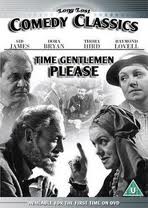
TIME GENTLEMEN PLEASE
UK, 1952, 79 minutes, Black and white.
Eddie Byrne, Hermione Baddeley, Raymond Lovell, Dora Bryan, Marjorie Rhodes, Thora Hird, Ivor Barnard, Sid James, Sydney Tafler.
Directed by Lewis Gilbert.
Time Gentlemen Please is one of those brief British comedies with social comment that proliferated in the decade after World War Two. It boasts a great number of British character actors and was directed by Lewis Gilbert who had begun directing films in 1944 and was to continue for the next sixty years. He was to move to bigger-budget films by the end of the 1950s with such films as Carve Her Name With Pride. He moved into action adventures, HMS Defiant, as well as making three James Bond films. In his later years he made Educating Rita and Shirley Valentine.
The film is a portrait of a village which is successful in productivity, is about to welcome a visit from the prime minister but has a difficulty with its old village character, Dan Dance (Eddie Byrne) who prefers to drink. When he is put into a home, the young vicar discovers that he is entitled to six thousand pounds a year support from the village – problems ensue. These films of the early 1950s may seem a little quaint in their style and in their subject, but they are a reminder of the great British tradition of focusing on villages, on small people, on social issues – with the ironic and comic touch.
1. The quality of the British comedy? Its particular characteristics, as illustrated here? British comedy of the fifties?
2. The importance of atmosphere of place, characters, the black and white photography?
3. The quality of situation comedy, British situations, the ordinary British people, workers? The background of politics, social background, the human elements?
4. The film's background of employment questions, industry, loafing, the values of work and the British attitudes towards Work? How interestingly presented, how humorously satirised?
5. The presentation of Irish characters in the English background? The portrayal of snobbery? Power struggles within small towns? Class snobbery?
6. The theme of money and the lengths to which people will go? The satire on the history of the town and the using of its legislation for money purposes? The old council, the new council? Danny's warders?
7. How enjoyable was Danny as a character? His endearing qualities, irritating characteristics? His values? Drink, relationship with people, with his family? His personal traits? The humiliation by the old council? Using his humiliation for the town's pride? His response to the challenge? His rising to high office? His attitude towards work? The humour of the ending? The points being made through this character?
8. The presentation of the old council? Their status in the town, their attitudes, meetings, use of power, hypocrisy, vote-seeking? Consider each of the individuals and their attitudes? What were the targets for this satire on British aristocracy, newly rich?
9. The contrast of the new council? Johnny and his sense of honesty, Danny's niece as a romantic heroine? The old lady calling for revolution? The new factory manager? The significance of their victory?
10. The importance of details of life, work, values in the town?
11. The picture of the workhouse and the curators? The comedy in Danny's being home on time?
12. The social values explored and communicated in this comedy?
Published in Movie Reviews
Published in
Movie Reviews
Tagged under
Saturday, 18 September 2021 19:28
Time For Killing, A / The Long Ride Home
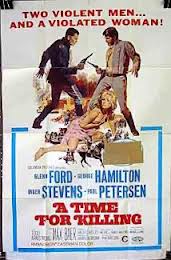
A TIME FOR KILLING (THE LONG RIDE HOME)
US, 1976, 88 minutes, Colour.
Inger Stevens, Glenn Ford, Kenneth Tobey, Harrison Ford, George Hamilton.
Directed by Phil Karlson.
A Glenn Ford western vehicle. It is directed by Phil Karlson, a noted action director of the fifties and sixties. The film is brief, has echoes of tragedy in its confrontation between representatives of North and South. It is the end of the Civil War, individuals prolong the war for personal victory and vengeance. Tragedy is the inevitable result. The action is presented quite vividly and in a staged and contrived manner to highlight the themes. Glenn Ford is at home in this kind of film. Inger Stevens has a good role ranging from innocence to vengeance. George Hamilton is adequate as the Confederate. The film is attractively presented in colour and Cinemascope - but with an incongruous musical score. One can note Harrison Ford, in a small role. A Civil War film with action and themes.
1. The focus of the title and the emphasis on killing and violence? (an alternate title was The Long Ride Home). How entertaining a western? A message western? The point of the film?
2. The use of Cinemascope, colour photography, the landscapes of the South, Mexico? The stars? The quality of the musical score?
3. American memory of the Civil War? The stances of North and South, the issues? Mutual cruelty? Prisons, battles? The pride of the South and of the North? The aftermath of the war? Its memory into the 20th century? The build-up of the prison atmosphere, the military, orders, executions? Individuals identifying with their sides and fighting the war? even after it was finished? The build-up to the end of the film and the futility of war?
4. The atmosphere of the fort, its isolation, its being a prison for the Southerners? The attitudes of the Northern military in commanding it? Isolation in the desert, surrounded by Indians? The establishing of the situation for the unfolding of the drama?
5. The opening with A Time For Killing in the execution? The young Southerner to be killed, the ordering of the black cooks to do the killing, their missing their target? The Commander and his orders? Woolcott and his attitudes, his executing the young man? Emily and her visit and watching? The involvement of those unwilling to kill in war and execution? An atmosphere of death?
6. The presentation of the Northerners? in command, winning the war, the Commander and his orders, his sending Woolcott out to pursue the escaped prisoners? Woolcott and his humanity, his love for Emily, his attitude towards the end of the war, his following orders, his pursuit of Emily and the growing feelings of vengeance, Emily and her lies and making him pursue revenge? The confrontation with tis southern Lieutenant? The death? His disillusionment in discovering the truth? The futility of war and the effect on his future?
7. Emily as an attractive young woman, the plans and memories of the past, her being in the prison, her being sent away, being captured by the Southerners, the deals? her attempting to kill the Lieutenant? Her being used for the pursuit? The sequence in the town? The violation? Her knowing the contents of the cable? Her living only for revenge, her lying to Woolcott? Her being present at the shootout and seeing his disillusionment? Her future? How credible this exploration of a woman's feelings in such a situation?
8. The Lieutenant and his control of the prisoners, the execution, the breakout and the violent attack on the Northerners, his loading the men? The deaths of his party and his relentless escape? The arrival in the town, the shooting of the courier, his concealing the news about the end of the war? The attack on Bally? The build-up to the confrontation with Woolcott? The North defeating the South? The two men an symbols of the Civil War?
9. The picture of men in both camps - their similarities, doing their jobs, their personalities, weaknesses, humour, survival? The hard riding, going down the hills, the shootouts, the deaths? Hatred? The longing to go home? The portrait of ordinary soldiers in war?
10. The quality of the action sequences: the execution, the escape and the fight, the riding and the chases, the sequences in the town, the final confrontation?
11. The pitting of the two men against each other at the end and the overtones of classic tragedy? How successful the build-up to the climax, confrontation, death and disillusionment?
Published in Movie Reviews
Published in
Movie Reviews
Tagged under
Saturday, 18 September 2021 19:28
Tilt
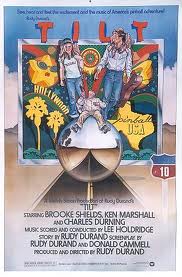
TILT
US, 1979, 111 minutes, Colour.
Brooke Shields, Charles Durning, Ken Marshall, Geoffrey Lewis, Lorenzo Lamas.
Directed by Rudy Durand.
is called a pinball rock musical. It focuses on the pinball craze and the people involved in playing it professionally and for money. The film is reminiscent of 'The Hustler' and even refers to this film at the end. However, it is junior league hustling with the heroine, Tilt, a 14 year old champion. She in played by Brooke Shields who made impact in such films an 'Pretty Baby' and 'Just You and Me, Kid' and 'The Blue Lagoon'.
Charles Durning plays the Jackie Gleason hustler role. The film moves through the sleazy world of hustling and confidence tricksterism but then at the end moves to a resolution which is sentimental, traditional morality and wears its heart on its sleeve very much. The film is the work of Rudy Durand, and the screenplay was co-written with Donald Cammell who worked with Nicholas Roeg for 'Performance' and who directed 'Demon Seed'.
1. An entertaining pop film? For what audience? Its impact on the young, middle-aged? For American audiences? Non-Americans? For fans of pinball playing? For those not interested in it?
2. Popular styles for the young audience? The involvement with the hero and heroine? The enjoyment of their adventures and wandering America? The gambling background, hustling, competitiveness, genius, success?
3. The jargon of the pinball world, its atmosphere, the places, the people involved, the betting, the competitions? The psychology of the confidence hustles?
4. The opening with Mr Whale and his impact? Neil and Henry and their trying to cheat him, his attack on them? The atmosphere of vengeance? His character, size, arrogance, seeing him continually eating, a champion dedicated to winning at pinball? Replay and his work for Whale? Seeing him in action during the film and winning the music, his dancing, his skills? The confrontation with Neil, the bet, the mutual challenging? Tilt and her visit during the night, his relenting and playing her, his admiration for her? The deal, his favourable attitude towards Neil? The sentiment at the end? His observations that he was the champion because he cared about it whereas Tilt was a genius but didn't give all?
5. Neil and Henry and the ambitions of young men for success in the music world? Their attempts to cheat the Whale? Why? The fight and their leaving for Los Angeles? Their living there for eighteen months and not succeeding? The build-up to the audition? Henry and his believing the managers and their propaganda? The audition and its failure? The delineation of their characters, heroes, sympathetic? The hustling side of their characters?
6. Neil an hero, his background, talent, behaviour? The encounter with Tilt? Inviting her to the audition after seeing her win? His realisation that he could use her? The set-up and the contrived fight? Her decision to go with him? His proper treatment of her? The various competitions? his hopes? The plans for the making of the tape? His relenting after she found out the truth? his admiration for her in her competition with Mr Whale? His realisation of what he ought to be - his future? How convincing a picture of this kind of young man?
7. Tilt and the introduction to her, the kids going to school ridiculing her, her taking the day off and going with the truckie and pretending she was a hustler? Her skill at pinball and her winning? Mickie and his getting the cut from her? The family fights, the accusations, her decision to move out? Sympathy for Neil? Wanting to win to get the money for his audition? Her participation in the hustling and using her innocent look, winning? Arriving at Corpus Christi and the impact of the truth? Her decision to battle it out with Mr Whale? The competition, the realization of her skills and limitations, her care for Neil? Her future?
8. The portrait of the adults - the initial antipathy towards Whale, despite his change at the end? The truckie with his foul mouth and yet his mouthing of American ideals? Tilt's parents and their bickering and accusations? Mick and his friendship although taking the money from her? The professionals and the con men of the United States?
9. The games, the visualizing of the pinball matches, the focus on the acts, the points, the explanation of the skills? The importance of the encounter in New Mexico with the bets and success and champions being taken in?
Published in Movie Reviews
Published in
Movie Reviews
Tagged under
Saturday, 18 September 2021 19:28
tick...tick...tick
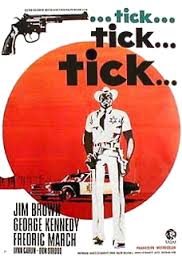
tick…tick…tick…
US, 1970, 100 minutes, Colour.
Jim Brown, George Kennedy, Fredric March, Lynn Carlin, Don Stroud, Clifton James, Bernie Casey, Dub Taylor.
Directed by Ralph Nelson.
Tick Tick Tick is a timely film of 1970 about race relationships. It was made only seven years after the march on Washington and comes from the immediate aftermath of the dramatised civil rights movement. It is interesting to note that director Ralph Nelson made Lilies of the field in 1963 and Sidney Poitier won the best actor award that year.
The film was written by James Lee Barrett, writer of a number of westerns in the 1960s and 1970s. He shows a small southern town, the election of a black sheriff by the black population, the intolerance of the white population of the county. This reaches a head when he has to arrest the son of a wealthy property owner in another county. Tensions, violence – hence the title of the ticking of the racial time bomb.
Jim Brown, former footballer, had emerged as a strong screen presence at this time in such films as The Dirty Dozen. He also had his series of films as the detective, Slaughter. George Kennedy had won an Oscar for Cool Hand Luke at this period. Fredric March was at the end of his long career. He had won two Oscars, one for Dr Jekyll and Mr Hyde and the other for The Best Years of Our Lives. He was soon to be diagnosed with cancer but his final performance was very strong in the version of Eugene O’Neill’s? The Iceman Cometh.
It is hard to realise, in many ways, how topical this film was for 1970. It is a reminder of the United States’ racist past, of tensions and intolerance in the south as well as the violence. In this case it serves not only as a film critical of racism but as a piece of cinema history of the period.
1. How good a film was this on its theme? How well did it retain audience interest and involvement?
2. Was it a just and fair portrayal of America in the sixties? How much propaganda for race tolerance? The picture of the deep south in the late sixties? A fashionable theme for films at that time? Its impact for American audiences, non-American audiences?
3. The overtones of the title and the bomb? Explosive situations? Did the film justify this title? The themes implicit in the title?
4. The film's use of colour, widescreen, deep south locations, the atmosphere of the town, of racial tension? The emphasis on the people and the places? The way of life, the place of justice in the counties? The contribution of the songs and their appropriateness at various times?
5. How interesting was the plot? The focus on the two men and their contrasting, black and white? The characterisation of the Mayor and his role in the town? The deputies and their hostility? The paralleling of the wives? The sheriff's work? The nature of the arrests? The crises facing both men? The mutual support of black and white? The example of this spreading to the whole town?
6. How did the film evoke a sympathy for Price? As a man, as an effective sheriff, the sequences of his home life and of relationship with wife and children, relationships with his deputies, the pressures by the mayor, his arresting people who needed arresting, the stands that he took, his strengths and his weaknesses? The democratic way of life in the south which elected this man as a sheriff? The role of prejudice?
7. The contrast with John Uttle? His strengths as a man, his disappointment in not being re-elected, his sense of values? His home life compared with that of Price? His relationship with his wife, her support of him? His need of help Price? his decisions to do so? The nature of his support? How good and strong a man was he? An image of a white tolerant American?
8. The contrast with the deputies? Benjy and his irrational violence, his playing cool, his attacking Price? The contrast with the other deputy who enjoyed playing with cars on the road?
9. The portrayal of the mayor, his role in the town, his crusty personality, his political opportunism?
10. The portrayal of the people of the town, their support of Price, those against him, the people at the pool room, their sense of justice, their apathy? Racial intolerance breeding in this kind of situation?
11. The arrest of the black man and the black feeling? The contrast with the Braddock incident? The portrayal of the accident, the aftermath, the importance of Price's chasing the young Braddock, his arrogance in the prison, the expected appeal of his father and the putting on of the pressure?
12. Was Price right in taking a stand against Braddock? The support of Little? The appeal for support of the people? The initial apathy? What changed their mind? How convincing?
13. The dramatic importance of the stance of the people at the bridge? Something for racial tolerance? For justice? The effect on the town?
14. How optimistic about race relationships was the film? Was it convincing in its optimism? The importance of such a film for the popular audience and their changing attitudes?
Published in Movie Reviews
Published in
Movie Reviews
Tagged under
Saturday, 18 September 2021 19:28
Ticket to Tomahawk, A
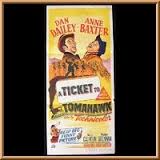
A TICKET TO TOMAHAWK
US, 1950, 90 minutes, Colour.
Anne Baxter, Dan Dailey, Rory Calhoun, Walter Brennan, Connie Gilchrist, Arthur Hunnicut, Marilyn Monroe.
Directed by Richard Sale.
A pleasant low-key satirical western. This kind of film was made with much more vigour in the sixties and seventies. However, it teams Anne Baxter with Dan Dailey. They had appeared in the musical You're My Everything in the previous year. At this time Dan Dailey was a very popular partner with Betty Grable and received an Oscar nomination for My Blue Heaven. Anne Baxter was in many films at Twentieth Century Fox. She received an Oscar for The Razor's Edge in 1946 and was soon to make All About Eve for which she received an Oscar nomination.
Of interest, Marilyn Monroe is one of the chorus girls and can plainly be seen in the yellow dress especially in a song and dance routine with Dan Dailey. The film shows the opening up of the railways and the double dealings of the stage coach companies with their hired gunmen. There are some comic pieces, a song and dance routine, Anne Baxter doing an Annie Oakley type role and all in all a pleasant piece of American heritage.
1. The entertainment value of the film? 20th Century Fox westerns, musicals and comedies of the fifties? The significance of the title? the railroad opening up, Johnnie as the passenger? The train must get through - and does!
2. How well did the film use the western and the comedy conventions? The satirical touch? The role of men and women, Anne Baxter as the Annie Oakley type? Dan Dailey as the salesman becoming hero? Rory Calhoun doing the villainous role? Walter Brennan as the comic driver? Connie Gilchrist and her gifts? A pleasant blend? The Indians added in?
3. Colour photography, Colorado locations? The western atmosphere? The frontier towns, the mountains, the railroads, the bridges? The steam trains?
4. The plausibility of the plot - a slice of Americana adapted for satirical western? Characters, situations, atmosphere?
5. Kit as heroine? Her grandfather teaching her to shoot? His role as marshall? Her being the deputy? Her tough attitude especially towards Johnnie? her getting the job done? Fascination with the show and with Johnnie? The attraction of Dakota and believing him? The humour about her being a woman and the talk about sex with Grandpa? her falling in love, getting the job done? The humorous ending with Johnnie on the go but with wife and family and home to return to? A vigorous American heroine?
6. Johnnie as hero? the only passenger on the train, his encounter with the gang, his being run out of town, his being the necessary passenger? his attraction towards Kit? Rivalry with Dakota? Getting the train through? Getting the boundaries of the town changed? A pleasant hero - even to song and dance?
7. Dakota as villain? rough and tumble, fights especially on the train roof? The stage coach company and the villains?
8. Johnnie's link with the Indians and the humorous backing of the Indians?
9. The train driver and his devotion to his train, getting it through? Walter Brennan and his humorous touches?
10. The glamour of the dancing girls and the concert in the middle of the wilds?
11. The way of life of the frontier towns? Law and order, violence for greed, heroes and heroines, the opening up of the west by trains? A pleasant look at American history through a comedy western?
Published in Movie Reviews
Published in
Movie Reviews
Tagged under
Saturday, 18 September 2021 19:28
Thursday's Game

THURSDAY'S GAME
US, 1974, 100 minutes, Colour.
Gene Wilder, Bob Newhart, Ellen Burstyn, Cloris Leachman, Martha Scott, Nancy Walker, Valerie Harper, Rob Reiner, Norman Fell.
Directed by Robert Moore.
An interesting and entertaining telemovie with quite some point. It portrays two businessmen played by comedians Gene Wilder and Bob Newhart. One represents the average decent man who tries to get on but fails and succumbs to pressures. The other is the surface type, potentially phoney who moves away from the status quo and branches out in middle age. Both actors give very good performances and are supported well by Oscar-winning actresses Ellen Burstyn and Cloris Leachman as their respective wives. Chris Sarandon makes a brief appearance as the tutor at the boys' camp. Nancy Walker is very effective in the seemingly unlikely role of the woman at the employment agency.
The cast contribute a great deal to the film and it is under the direction of Robert Moore who was later to film the Neil Simon comedy Murder By Death and The Cheap Detective. Within its short space of time, Thursday's Game mirrors what must be the lives of many men in contemporary America and makes valid points about this way of life.
1. An entertaining and interesting telemovie?
2. The contribution of the stars and their style, the humorous and serious style of the film, its urban American atmosphere? The contribution of the score, the song and its lyrics?
3. The focus of the title, its use as a symbol? The reality of Thursday's Game, its unreality and indicating the themes of men caught up in the 20th century rat race and its disillusionment?
4. The film's reflection of the American way of life, its pressures, the world of business, employment and unemployment, success? Themes of American marriage, affairs? Competitiveness amongst men, breakdown? The communication of the themes by the comedy routines, humorous dialogue, ironies? The communication with the serious sequences and their juxtaposition with the humorous?
5. The creation of a man's world? The Thursday's games, cards, the atmosphere of card playing, the gambling mentality, friendships? The fickleness of friendships and competitiveness? The theme of saving face? unemployment, dependence, a growing sense of hopelessness for those who are not succeeding? The interaction of men within this kind of group, professional men? The effect of each on the other and his view of himself and outlook on life and success?
6. The focus on Harvey and Gene Wilder's performance? The TV world, seeing him at work, his programme, his disappointment with the ratings? The interview with his boss and his going? His going to the agency and his numerous discussions with the woman there? Her sympathy for him? her working on his credentials and yet failing? The pressure on him to pretend? to what purpose? his pretending with his wife? with Marvin? The possibilities of an alternative job with Marvin and his refusal? his carrying on as if everything was successful and yet the wastefulness of his day to day life? The patterns of failure moving into his life? His love for his wife, her support for him? his visit to his son and seeing him, the discussion on the way home? his continued wandering and lying? The confrontation with Marvin and the final decision? The possibility of change, the possibility of a future? A comic-serious performance? Satire on the type of man being portrayed, sympathetic observation of this kind of man? Particularly American, universal picture of this kind of man in the seventies?
7. The contrast of Marvin and his presence at the game, his success and his loud clothes and the suggestions taken from Harvey? His phoney style? his sympathy towards Harvey and wanting to give him work? Their going the rounds together and their discussions? His support, his advice? His clashes with his wife and his wanting to leave her? Her emotional hold on him and his inability to break out? The pros and cons of his breaking his marriage? His wanting to have an affair? His inability to handle the crisis and the effect of the sequence with Lois in the restaurant? What moved him finally to decide to go away? his urging Harvey to do the same? The contrast of these two men as representing the average American businessman9
8. Lynne and Ellen Burstyn's style? Her portrayal of the ordinary wife, sympathetic, unable to break through to the truth? Her behaviour at home and her breaking? Her worry, hurt? The visit to their son? her being slow but sympathetic?
9. The contrast with Lois and the audience only hearing about her and her hysteria? The audience finally seeing her and the tantrum in the restaurant? The ambiguities of humour and seriousness in this sequence? Her being hurt? What would her future be?
10. The lady in the employment bureau and her work, sympathy, devices? her weeping for Harvey? Her helplessness?
11. The sequence with the visiting of the boy at the camp and the attitudes of the tutor, the jargon of the times, the new generation America and the way it is being trained?
12. How satisfying was the resolution? The moral stances behind the decisions taken? The confrontation of success and failure? The need for responsibility? The alternatives in the choices to be made? Personal integrity versus professional success and reputation?
Published in Movie Reviews
Published in
Movie Reviews
Tagged under
Saturday, 18 September 2021 19:28
Third Day, The
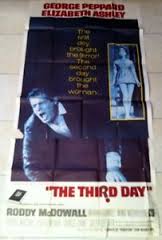
THE THIRD DAY
US, 1965, 119 minutes, Colour.
George Peppard, Elizabeth Ashley, Roddy Mc Dowall, Arthur O’ Connell, Mona Washbourne, Herbert Marshall, Robert Weber, Charles Drake, Sally Kellerman, Vincent Gardenia.
Directed by Jack Smight.
The Third Day is an interesting murder mystery with a difference. The theme is amnesia. George Peppard is the hero, accused of trying to kill his girlfriend (Sally Kellerman) and trying to reconcile with his wife. However, after the accident he cannot remember anything and has to rediscover his past. One of the challenges about his past is whether he was a good person or a bad – and have the possibility of redeeming the past.
There is quite a range of characters, possible suspects. Roddy Mc Dowall is very strong as the hero’s rather strange brother.
The film has a very strong cast, is well written, is directed by Jack Smight who directed quite a number of films at this period including several Paul Newman vehicles including Harper and The Secret War of Harry Frigg. He also directed the very interesting No Way to Treat a Lady as well as The Illustrated Man, both with Rod Steiger. He directed a version of John Updike’s Rabbit Run and the more spectacular films, Airport 1975 and The Battle of Midway.
1. How successful a mystery thriller was this film? Why? (The meaning of the title?)
2. How successfully did the film communicate amnesia? How did the film screenplay adapt its technique to this communicating of the effect of amnesia? The appearance of the hero from the side of the cliff? His entry into a world which he does not understand? His meeting of his relations whom he does not remember? The fact that the audience could identify with the hero and feel the same sense of lack of understanding? How effective was this in involving the audience and helping them to understand the film?
3. Impressions of the hero? Did it make sense to know that he had a bad reputation? The fact that he could not remember his past?
4. Responses when the hero met the people he was related to and whom he knew: his relationship to his wife and the discovery of their estrangement and yet her love? The sympathy of his aunt? The relationship with the founder of the firm and the difficulty of communication? The antipathy towards his cousin? His dependence on the lawyer and the lawyer's trying to help him? What did this reveal about the hero as a person and about the other people?
5. How well did the film point the downhill progress of the hero before his amnesia? Did it explain it well? In his amnesia state? was it credible that he could have been bad? a good person? His concern for the firm etc.? His preoccupation that the girl was in the accident?
6. How ominous was the piano player? How sinisterly was he presented in the film? vicious in any way? Why?
7. How mysterious was the girl? Did the fact that the audience knew as little about her as the hero? That the audience could only pick up hints about what others said? Did the flashbacks illustrate the kind of a person the girl was? What hold did she have on the hero? Why? What was she doing in the car? How interesting was the picture of the industry in the town) The fact that the cousin was trying to exploit it? The need for change? The socia atmosphere of the men and their fears about their jobs? The need for something to be done? Was this side of the film well handled?
8. The film had the theme of redeeming one's bad past and the need for atonement? How was this illustrated in the behaviour of the hero? Towards his wife? Towards the people in the town? His plans for changing industry and his efforts to do this? The need for change?
9. The theme of memory and its unreliability? The hero's memory? The memory of the others in the film?
10. Was the cousin a convincing villain? sinister? At the end was he sinister enough? What was he after? His antipathy towards the hero? His manipulating of his uncle?
11. The importance of the sequences where the uncle communicated that he understood?
12. The ultimate villain, the piano player? Was his role in the film credible?
13. The importance of the denouement? Was it too melodramatic? Interesting? Exciting? Credible? Why did the piano player hate the hero?
14. Was the ending satisfying? Was the film meant to be any more than a thriller? Why?
Published in Movie Reviews
Published in
Movie Reviews
Tagged under
Saturday, 18 September 2021 19:28
Thin Man, The
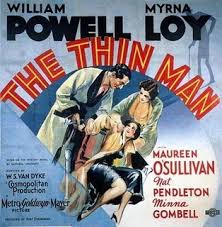
THE THIN MAN
US, 1935, 93 minutes, Black and white.
William Powell, Myrna Loy, Maureen O'Sullivan, Cesar Romero.
Directed by W.S. Van Dyke.
The Thin Man was the first in a series of seven films which were produced over ten years by MGM. They were based on characters by writer Dashiell Hammett. The characters are Nick and Nora Charles. He is a former detective, she his rich wife. The spark of the film is in their relationship, living of the high life, the wit of the verbal interchanged. They also solve murder mysteries.
The screenplay was written by Albert Hackett and Frances Goodrich, who wrote a number of films over the decades, including Naughty Marietta, Rose Marie, The Firefly, Lady in the Dark, It’s a Wonderful Life, Easter Parade, Father of the Bride and Father’s Little Dividend. The film was directed by Woody Van Dyke, who directed a whole range of films at MGM during this period.
The thin Man was nominated for several Oscars including best picture, director and William Powell as best actor. William Powell and Myrna Loy proved a very popular screen couple.
1. The classic status of this film? Small budgeted and quickly made in the thirties, the immediate popularity, the series and continued popularity for a decade? Why? The appeal now?
2. The comedy contribution especially of the interaction between the stars, the flip and ironic attitude towards society, crime, marriage? The ironic tilts at society? The mystery aspects and victim's clues? How well did the film blend comedy and mystery?
3. The tone of the thirties for entertainment - the picture of New York society, smoothness of presentation? M.G.M. style in black and white photography, sets?
4. The particular qualities that Myrna Loy and William Powell brought to their roles? The quality of their marriage, the easy relationship between the two? Nick and his work, Nora and her wealth, the interplay of detective work and wealth? The humorous contribution of Asta and the rather human-like behaviour of the dog? Sure-fire box office combination?
5. The introduction to the murder mystery with Wynant? his moods, sacking of his assistant, response to Dorothy and her forthcoming marriage? His work, mysterious going away, his relationship with Julia and his attitude towards her taking the bonds? Sufficient information and atmosphere for crime and mystery?
6. The range of suspects and their delineation? Strong character drawing, elements of suspicion? Mimi as the empty-headed society wife, attitude towards her husband, towards Chris, towards her son and daughter, towards money? Her taking the link from Julia's dead hand? Gilbert and the satire on the introverted theoretical type? Chris as younger than Mimi and acting suspiciously and his bigamy? Morelli and his association with Julia? The lawyer and his unobtrusive presence - taken for granted and then the truth? Tanner and his relationship with Wynant?
7. Julia and her liaison with Wynant, financial situation, her murder?
8. Nunheim and his involvement, exploiting the situation, the inevitability of his death for blackmail?
9. The investigations by Nick and his skill, his presence? The party sequence, the search of Wynant's laboratory, working with the police?
10. Comic aspects: the party as a long sequence, the Christmas sequence, sending Nora to Grant's Tomb?
11. The traditional denouement with all the suspects present at the table? Nick and his not knowing the answer? His contriving the situation and piecing together the plot - with the audience working with him? The surprise of the ending? How satisfying an entertainment, comedy, themes of right and wrong, justice, crime?
Published in Movie Reviews
Published in
Movie Reviews
Tagged under
Saturday, 18 September 2021 19:28
Thief of Paris, The
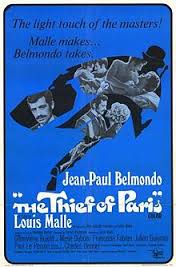
THE THIEF OF PARIS
France, 1967, 120 minutes, Colour.
Jean- Paul Belmondo, Genevieve Bujold, Marie Dubois, Francoise Fabian, Marlene Jobert, Bernadette Lafont.
Directed by Louis Malle.
The Thief of Paris is a star vehicle for Jean- Paul Belmondo. By this time he had been a star for ten years and had made his name in a number of films by Jean- Luc Godard, especially Breathless with Jean Seberg. He had also shown himself as an acrobatic hero in such fantasies as That Man From Rio, Chinese Adventures in China by director Philippe de Broca. Belmondo was to continue in films, much more serious films during the 1970s including Borsalino and Stavisky and continue to make films until the early part of the new century. Genevieve Bujold, on the other hand, the Canadian actress, was at the beginning of her career with La Guerre est Finie and was soon to appear as Anne of the Thousand Days.
The film is a period piece, set in 1900 – an echo of those gentlemen burglars like Raffles. Belmondo portrays a young man whose uncle squanders his fortune, stops him marrying his sweetheart and he decides to get his revenge by robbing his uncle’s jewels. He then develops a taste for robbery – and becomes expert at it. The film was presented in a very tongue-in-cheek vein.
The film was written by Jean- Claude Carriere, whose long career enabled him to write films for such distinguished directors as Luis Bunuel (Phantom of Liberty, That Obscure Object of Desire), for Jean- Luc Godard (Every Man For Himself, Passion), for Daniel Vigne (The Return of Martin Guerre), for Andrzej Wajda (Danton) and for Volker Schlondorff’s Swann’s Way. At the beginning of the 21st century he was still writing prolifically including the Nicole Kidman film, Birth.
The film was directed by Louis Malle (for whom Carriere wrote Black Moon). Louis Malle emerged as part of the new wave of French cinema in the late 1950s. He made a number of classic films in the 60s including Zazi in the Metro, The Lovers, Elevator to the Gallows. In the 1970s he made such classics as Murmur of the Heart, Lacombe Lucien. He then went to the United States where he made Pretty Baby. He settled there and married Candice Bergen. American classics include Atlantic City, Alamo Bay and Damage (made in England). He made his autobiographical film in 1987, Au Revoir les Enfants, the story of his childhood during World War Two, the Catholic school he attended and the principal who sheltered Jewish children and who was betrayed.
1. How enjoyable a film, as comedy, adventure, serious, historical drama, the blend of these ingredients? Which predominated, was meant to predominate?
2. Jean Paul Belmondo and his personality and style? His being the focus of the film? The kind of atmosphere that he contributed to it?
3. The film and the importance of style: costumes, Parisian settings, London, Belgium? The world of Paris, rich homes, society, poverty, the criminal world, the world of politics in the 19th century? A microcosm of French society?
4. Audience involvement through the structure: the initial robbery with George's slapdash approach to it? The importance of the voiceover narrative and George's point of view on things? The flashbacks and the return to the robbery of his own house? The irony of the ending? The importance of the direct narrative, the importance of memory, the irony of George's career?
5. The significance of the flashback to childhood, George, and his cousin Charlotte and the way of life of their Uncle? The irony of the amount of money that George was to inherit, the inevitability of his Uncle's bad management of the money and callous attitude?
6. The build-up to George's return: the confrontation with his Uncle, his Uncle's double-talk and the loss of the money? Charlotte and her hesitation, her fiance? Her sharing the attitudes of her father? The importance of the party and George's presence? The priest and his appeal and the later irony of his identity? The importance of the remarks made, the picture of society and the audience's judgment on it, in view of George's robbing the people and the reasons for the family's hushing it up for scandal? The Uncle's anxiety and calling off Charlotte's wedding? Charlotte and her shrewdness in understanding what had happened, her not giving George away? The atmosphere of light-heartedness, social critique, the beginnings of a film about crime?
7. The importance of the meeting of George and the priest? The humour of their meeting and the identification of the priest? His links with criminals, the gang and their laws and finesse?
8. How humorously and satirically was this illustrated by the greed of the Belgian passenger, his taking them home, inviting them to rob his house?
9. How entertaining was the picturing of the criminal group in action: the English sequences, the sister and the brothel? The lady friend and her salon in Paris? The way of life in France? The irony of George's school friend's wife giving them the information? What were the implications of this picture of criminal conspiracy amongst society? And the audience being invited to be on the side of the criminals?
10. The presentation of George in action with the group, solo? His pride and skills an a thief? Motivation? His visiting his friend after the irony of almost being caught? The irony of his friend's wit, being the source of information? The gradual being led into the world of politicians, the clash of the political world with the world of the criminals?
11. The humour of catching the wife robbing her husband and the liaison between the two? Of George's directing this woman to her Uncle in order to bleed him? Infatuation, the dotage of the Uncle? The build-up to his death and the various aspects of greed about his will? The humour and irony of George forging his will?
12. The significance of the Cannonier story? Cannonier an the master criminal, Devil's Island and his swap, his presence on the Normandy coast, the messages and the warnings given him? The humour of the encounter with George in the hotel room, the ironic background of the politics and the right wing sentiments being expressed, the intolerance? The greed of the hotel keeper and the death of the old woman? The character of Cannonier and George's liking him? The pathos of his sudden death?
13. The satire and moral drawn in the presentation of George's Uncle, his old age, dotage and lust? The anger and hatred in his death? George's rewriting his will in his presence?
14. The political background? The satire in the presentation of right-wing politics?
15. Charlotte leaving her father and joining George? The bond between them, their travel, robberies? The future for the tow of them?
16. The light touch and yet the serious implications? Is this what people mean when they talk about Gallic humour?
Published in Movie Reviews
Published in
Movie Reviews
Tagged under